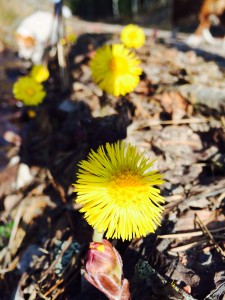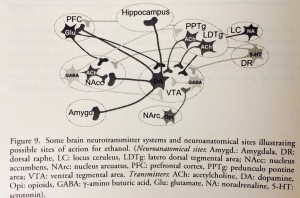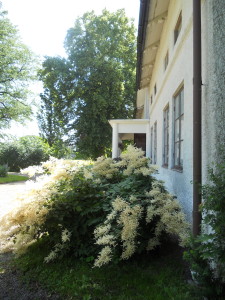Author Archives: Anna
Hi there,
Long time, no see. What I wrote last time is very important. I will soon continue to write on theoretical pharmacology. This is new. I like that. New pharmaceutical drugs create new jobs.
I saw a program tonight about addictive drugs. My major take home message is that it is very important to underline that addictive drugs are very dangerous during the development of the brain. I may be wrong, but from what I remember, the brain is considered to be mature at an age of 25 years.
I cannot stop watching the photo above. One of my favorite moments in life. A simple walk in beautiful weather. It cannot get better. This is how I stimulate my brain reward systems.
Take care,
Anna
Theoretical pharmacology.
Since I do not have access to a laboratory, I continue with theoretical pharmacology. This is rather nice and convenient. But remember, these are hypothesis, so they are not accepted by the scientific society yet. It may take years.
I started my PhD studies in 1999 at the Department of Pharmacology, University of Gothenburg. I was rapidly introduced to scientific meetings and understood that Professor Arvid Carlsson had come up with beautiful ideas. He has given a historical review lecture. Here, the concept auto receptor is explained. Please, see the following link:
I went to the scientific meeting and listened. This was actually only 2-3 weeks from when I started at the department. I was asked what my subject was and I explained that I was going to study the relation between acetylcholine and dopamine with regard to ethanol reward. Since this subject was new to me I listened to the meeting.
What I remember from that meeting was that Professor Arvid Carlsson was curios about the existence of functional nicotinic acetylcholine auto receptors. I guess he mentioned that since I mentioned acetylcholine.
My subject was to study the role of various nicotinic acetylcholine receptor subunits involved in accumbal ethanol induced dopamine stimulation. At a very early stage, I performed dose-response on nicotinic antagonists on locomotor activity in mice. These are very kind experiments. It is important to remember that many people are involved in performing experiments. I have explained previously that you need a lot to do research: lab, research grants, staff etc. That is why I today only can do theoretical research.
One of the nicotinic antagonists was di-hydro-beta-erythroidine. These experiments are explained in (Larsson et al, 2002). And this finding is mentioned as “dose-finding experiments with no effect per se”.
Surprisingly, a biphasic dose response curve was demonstrated. And, since it is an antagonist, it was surprising to find that it stimulated locomotor activity. Clearly, to my opinion, there are feedback mechanisms.
The results of these experiment are documented at the Department of Pharmacology at University of Gothenburg. But, of course, they must be repeated, and be put in a broader perspective. This is, to my opinion, a very difficult and challenging subject. The reason I write about it is that I have a gut feeling that it is important.
In research there are always so many question asked. And there are so many hypothesis raised. The challenge is to sort out what is important.
This experiment has been in my mind for several years.
I think it is about two years ago. I saw a curve in a magazine. In economics. Completely different from pharmacology. That curve reminded me of that experiment and I started to think about the study. And I also had in mind what Professor Arvid Carlsson had talked about.
What is important to sort out, is that I am talking about functional nicotinic auto receptors. This is very difficult to demonstrate.
Ok, that is all for tonight. And please try to understand that I put a lot brain energy to this. I actually get headache of thinking sometimes.
And it is good to have good reading glasses 😉
Take care,
Anna
This, I wrote on FB.
Finns påskens motsvarighet till julnöt?
Jag kan inte låta bli att ha någonting att klura på.
Mina kunskaper inom ekonomi är ytterst modesta. Men vad jag har uppfattat så finns det cykler inom ekonomi så väl så som inom biologi. Precis som biologin, med årstidernas växlingar, månens skiftningar etc, så finns det kanske liknande skiftningar även inom ekonomi. Åtminstone känner jag till inflation och deflation. Depression verkar ju finnas både inom ekonomi och biologi.
Jag brukar ibland i nyheterna se, utifrån en lekmans ögon, hur aktiemarknaden ibland ökar och ibland minskar. Av en slump råkade jag se en aktiekurva som väldigt mycket liknade resultatet av ett experiment jag erhöll under studietiden. Den studien skulle kunna ha tolkats som ett funktionellt stöd för nicotinerga autoreceptorer.
Inom farmakologi så finns begreppet autoreceptor.
En receptor kan beskrivas som ett lås där rätt nyckel (en molekyl) kan öppna upp för en förändring i kroppen som resulterar i en anpassning till yttre och inre miljö. Det verksamma ämnet i ett läkemedel binder till en receptor.
För att finjustera förändringen finns t ex autoreceptorer som hjälper till att reglera aktiviteten. Allt strävar efter jämvikt lärde jag mig någon gång. Det här är ett väldigt komplext samspel som jag känner stor ödmjukhet inför.
Någonting jag har lärt mig under åren är att ju mer man läser, ju mer förstår man att man inte förstår.
Min påsknöt är:
går det att definiera autoreceptorer inom ekonomi?
Inser att det i så fall torde vara komplext eftersom jag känner till att det finns micro- och makroekonomi.
Finns de då som naturliga krafter och/eller sker finjustering via olika ekonomiska åtgärder?
???
This is a challenge. Trying to describe the brain reward systems. I have always been fascinated by the brain function. It started with an extra course in neurobiology in Uppsala.
There is little teaching about the brain reward systems when it comes to today’s drug policy in society and politics. Hence, this an attemt to description.
First, I would humbly like to point out that this topic is very complex, and that there is currently a strong understanding of brain function, but, however, a lot of knowledge is still missing. The big challenge is to realize that brains are different, and thus, it can be difficult to understand how different people think, feel and so on. Furthermore, understanding brain function will increase eg why and how different people act in the micro- and macro world.
Professor Jörgen Engel was my supervisor in neurobiological research, and he has dedicated his life to study how alcohol affects the brain reward systems. Both acute and also longterm effects. Since ethanol is such a small molecule with both hydrophilic and lipophilic properties, it can affect the brain in so many ways with following complex pharmacology.
Brain reward systems (pluralis!) are extremely important for a species survival. They help to stimulate/reinforce different behaviors such as a feeling of pleasure when eating, drinking, reproduction etc. Thus, fundamental behaviors that are important for survival. So-called positive reinforcement.
What is then brain reward systems? From what I know today, they consist primarily of dopamine neurons that are located in distinct pathways in the brain. It has been noticed in repeated studies that addictive substances have in common to increase the amount of dopamine at the same time with a sense of pleasure. There are of course many other neurotransmitter systems involved in reward.
Addictive drugs (part of a plant) such as amphetamine, cocaine, alcohol and nicotine etc stimulate brain reward systems. If they are aused over a broader time period addiction can occur. In addiction, there are no positive effect of the drug, but rather, the drug is taken to remove the negative effects. For example tolerance and withdrawal symptoms occur. Tolerance is when a higher dose of the drug is used to achive the same effect as in the beginning.
Today, doctors are assisted with a diagnostic system (DSM) which helps them to determine if there is abuse or addiction . There are good pharmaceutical drugs to be used in alliviation and in different assisting programs. It is important to remember that social support in addiction is very important in assisting programs. Unfortunately, more research is needed to develop more effective drugs.
It has also been shown that anabolic steroids, during prolonged use, affects the brain in a very negative and complex way. Anabolic steroids, are in my opinion, very dangerous. They can influence behavior so that eg aggressiveness is displayed. The addict may also experience being the world’s best .
An important aspect is that drugs can affect fetal development so that abnormalities can occur. Drugs should definetly be avoided during pregnancies.
I promised to write prevously on this very important subject. This is written in a simle way, but I hope it increases, at least a little, the understanding of brain reward systems.
Ikväll så skriver jag på svenska. Det är ju lite dumt, jag vet inte om det är någon som läser vad jag skriver. Tanken när jag började skriva var att hålla kontakt med de jag känner. Jag har mött ganska många genom livet så jag tycker det är skoj att kunna hålla kontakt eftersom dagens samhälle är så busy. Dessutom, har jag märkt, att det är roligt att läsa det jag har skrivit. Man glömmer så lätt.
Jag befinner mig i en väldigt märklig situation i mitt liv. Eller jag ska nog skriva att jag befinner mig i en situation som jag inte har varit med om tidigare. Eftersom jag är diplomatiskt lagd så försöker jag att lösa detta på bästa sätt. Det som skiljer djur från människor är tanken. Att tänka. Så jag gör mitt bästa. Jag håller på att ta reda på vem min skarprättare är. Märkligt att det finns de som njuter av att vara arkebusator.
Man har gjort studier och sett att människor som normalt ej skulle tortera andra människor kan tortera när de får order från högre instanser. Då försvinner det sk samvetet. Samvete är någonting som jag finner mänskligt.
Vad tycker du? Host, host.
Je t’embrasse,
Anna
I have a confession to make. I have been scared of writing poetry. I never thought that I could compose a poem. I am too humble.
It is getting a little late, over midnight. I am just about to go to sleep. But I just got a strong feeling of writing a poem concentrate of my life.
Sparkling night.
Outside my window, high up in the sky, unreachable, the moon gives comfort.
I feel trust in heaven, endowed with stars. Bright and with beauty.
The stars are guides in life.
They give us direction. Advice. No compass in life needed.
A star represents a person. Rarity. Fragility. Sensitivity.
Romance.
Je t’embrasse,
Anna
I am back in Stockholm after two days in the countryside. I have realized that I am raised in a very conservative spirit. However, since I am forty years old I am mature and have realized a few things in life. Fundamental aspects.
The man should take care of her woman. In Sweden, the land of communism, woman is expected to take care of her man, children, work etc. This at a very low wage.
Imagine. What if woman is set all alone? What would she do? Nothing? Adjust to the mob? Join the communist party?
I have lived alone now for almost a decade. I have changed a lot during these years. This is very difficult for some people to accept. I do not understand why. I have a rather good education which is not good enough for Sweden, the mother of communism.
I would very much like to live together with a man. But since I have been hurt I am very careful.
Of course I feel a lot sorry for this. I think of my sisters. I know I have many sisters in the same situation as I am. So, I hope I can be of some support for future women generations.
I cannot stop thinking about the role of a man and a woman.
I am grown up in a very conservative environment. My father has always taken care of my mother, brother and me. That is what counts. Family.
So important.
I take care of my parents and brother in my turn. This is so natural for me. It feels so, I don’t know what to say, but horrible to let my parents live elsewhere but at home.
I am so conservative and traditional.
But, let me put it this way. What would you be without your family? Relatives? I think you should ask yourself: what is important in your life?
This way of living is very common on south of Europe. I find it so sensible. Human.
Can you, please, give me some of your input?
Je t’embrasse,
Anna


 Svenska
Svenska


